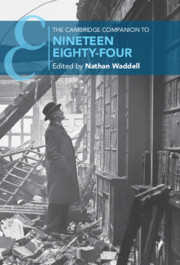Book contents
- The Cambridge Companion to Nineteen Eighty-Four
- The Cambridge Companion to Nineteen Eighty-Four
- Copyright page
- Contents
- Figures
- Contributors
- Acknowledgements
- Chronology
- Abbreviations
- Introduction
- Part I Contexts
- 1 Teaching and Learning in and beyond Nineteen Eighty-Four
- 2 The Virtual Geographies of Nineteen Eighty-Four
- 3 The Politics of the Archive in Nineteen Eighty-Four
- 4 Orwell and Humanism
- Part II Histories
- Part III Questions
- Part IV Media
- Further Reading
- Index
- Cambridge Companions to …
1 - Teaching and Learning in and beyond Nineteen Eighty-Four
from Part I - Contexts
Published online by Cambridge University Press: 18 September 2020
- The Cambridge Companion to Nineteen Eighty-Four
- The Cambridge Companion to Nineteen Eighty-Four
- Copyright page
- Contents
- Figures
- Contributors
- Acknowledgements
- Chronology
- Abbreviations
- Introduction
- Part I Contexts
- 1 Teaching and Learning in and beyond Nineteen Eighty-Four
- 2 The Virtual Geographies of Nineteen Eighty-Four
- 3 The Politics of the Archive in Nineteen Eighty-Four
- 4 Orwell and Humanism
- Part II Histories
- Part III Questions
- Part IV Media
- Further Reading
- Index
- Cambridge Companions to …
Summary
The chapter draws on The Lion and the Unicorn to argue that Nineteen Eighty-Four, like ‘Such, Such Were the Joys’, represents a shift in Orwell’s thought as he critiques a meritocratic social order in a depiction of a dystopian society ordered around intellectual ability. The chapter examines intellectual control in Oceania through two processes: firstly, ‘doublethink’, a process through which the most intelligent members of society must submit themselves more completely to an act of self-hypnosis and secondly, the chapter contextualizes Ingsoc’s slogans against Animal Farm to argue that Orwell identifies political slogans with mind control. The chapter argues that the novel is Winston Smith’s thwarted bildungsroman, analysing how its form is designed to interrogate Ingsoc’s slogans. It examines the scenes of Winston’s self-education as he reads Goldstein’s Book and the children’s history textbook and suggests how the novel’s torture scene is aligned with the pedagogic, as the pupil/teacher relationship is redefined by Orwell as a relationship based upon intellectual manipulation. The tension between the pedagogic form of the novel, which explores political slogans and creates curiosity in the reader, and its criticism of the catechistic model of teaching, renders the novel paradoxically an anti-pedagogic pedagogic text.
- Type
- Chapter
- Information
- The Cambridge Companion to Nineteen Eighty-Four , pp. 23 - 36Publisher: Cambridge University PressPrint publication year: 2020

